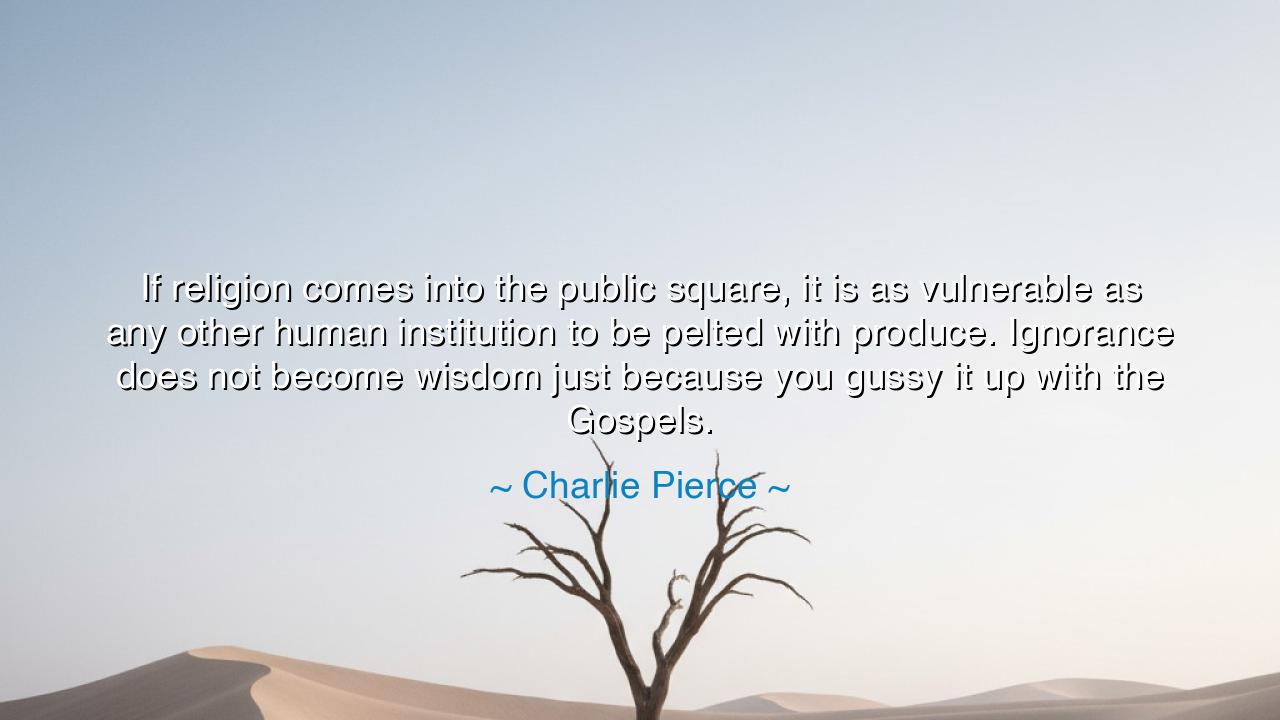
If religion comes into the public square, it is as vulnerable as
If religion comes into the public square, it is as vulnerable as any other human institution to be pelted with produce. Ignorance does not become wisdom just because you gussy it up with the Gospels.






Hear, O seekers of truth, the words of Charlie Pierce, who declared: “If religion comes into the public square, it is as vulnerable as any other human institution to be pelted with produce. Ignorance does not become wisdom just because you gussy it up with the Gospels.” In these words there is both warning and counsel: that faith, when it enters the realm of politics and debate, must be prepared to meet the same tests and criticisms that confront all mortal institutions. And further, that foolishness, even when clothed in holy language, remains foolishness still.
The origin of this teaching is the long struggle between faith and reason in public life. For ages, men have sought to use the authority of religion to command respect, to shield themselves from criticism, to sanctify their own ignorance by draping it in sacred texts. But Pierce, as one who observes the contests of politics and society, reminds us that once faith enters the public square, it becomes part of the common discourse, no longer shielded by sanctity but open to debate, dissent, and even ridicule. This is not sacrilege, but the nature of free and open society.
Consider the deeper meaning: when faith remains in the heart and the sanctuary, it may guide the soul without hindrance. But when it becomes the law of the land, or the banner of a movement, it must endure the same scrutiny as any human claim. Ignorance, dressed in the robes of religion, does not transform into truth. To mistake passion for knowledge, or to clothe prejudice in holy words, is to corrupt both faith and reason. True wisdom shines brighter when tested, while falsehood crumbles when exposed to the light of public examination.
History gives us many examples. In the days of Galileo Galilei, the church declared the earth the center of the cosmos, condemning him for daring to speak otherwise. Their authority was clothed in scripture, yet their claim was ignorance. Time revealed the truth, and the church itself was compelled to admit its error. Thus we see that to shield falsehood behind holy texts does not make it true—it only delays the triumph of truth. Pierce’s words, then, echo the lesson of history: no claim is immune from scrutiny, and the sacred must not be used to sanctify ignorance.
But there are also examples of faith standing firm when tested. Consider Martin Luther King Jr., who brought the language of scripture into the public square, not to sanctify ignorance but to illuminate justice. His words, though rooted in religion, spoke of universal truths, of equality, of love stronger than hate. They endured the pelting of criticism, yet they withstood it, for they were not born of ignorance but of wisdom, humility, and truth. Here we see the difference: faith that cloaks arrogance falters, but faith that seeks justice endures.
The lesson, then, is clear: if you bring your religion into the marketplace of ideas, do so with humility, not with presumption. Do not mistake the sanctity of scripture as a shield against error. Recognize that true wisdom welcomes challenge, for it knows that the fire of debate refines truth as gold is refined in the furnace. But falsehood, wrapped in holy garments, will always be revealed when the garments are stripped away.
Practical wisdom follows: examine your beliefs, and do not fear to test them. Distinguish ignorance from wisdom, even when ignorance comes clothed in noble words. Respect the public square, for it is the crucible where all claims, sacred and secular, must be proven. And above all, walk humbly, remembering that the Gospels, or any scripture, are not ornaments for pride, but guides for the heart.
Thus let the words of Charlie Pierce endure: “Ignorance does not become wisdom just because you gussy it up with the Gospels.” For in this reminder lies the safeguard of both faith and reason—that truth must stand on its own, tested and proven, not hidden behind the trappings of sacred language. And so, O listener, be bold in faith, but be wiser still in humility, lest you mistake the voice of arrogance for the voice of God.






AAdministratorAdministrator
Welcome, honored guests. Please leave a comment, we will respond soon